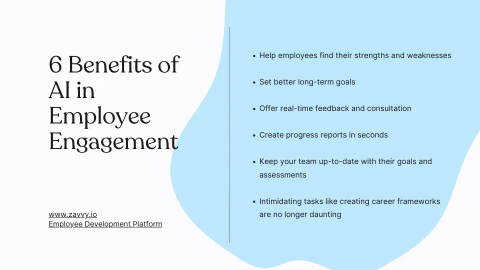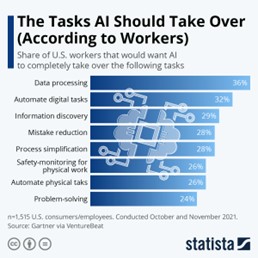Embracing AI in Business Analysis: A Guide for BAs
Artificial Intelligence in business analysis is fast becoming the next big evolution of the BA practice. It acts as a superpower to enhance decision-making, automate repetitive tasks, free up time for strategic work.
BAs add value to organizations that AI cannot replace, like problem-solving, critical thinking, communication, and collaboration. But with increasing competition in companies, BAs can use an assistant like artificial intelligence to do more with less. This article covers the growing influence of AI in business analysis and how you can thrive as a business analyst in the age of generative AI.
AI in Business Analysis: A Growing Field
Business analytics powered by AI can detect patterns, anomalies, and deviations and raises them for review by business analysts.
Business analysts are embracing AI/ML tools to make more informed decisions and improve their competitive advantage. Tools like Tableau, Power BI, and others increasingly have a significant AI component
BA coaches have also begun thinking and producing content on how to use AI tools like ChatGPT for business analysis.
The growth of AI tools has also led to an increasing push for human oversight over AI. For instance, the European Commission has proposed a regulation the stipulates how high-risk AI systems like facial recognition algorithms should be created with human oversight in the loop.
Developing regulations like these will affect downstream industries like business analysis in due time.
AI-enhanced Business Analysts
The most beneficial way to deal with the rise of AI is to enhance your existing skill set using it. Generative AI tools can also lead to happier and more productive workers.

Here are some ways you can adapt to the changing reality:
Know your Core BA Skills
As recently as May 2023, Forbes recognized six core business analysis skills:
- Analysis: Parsing large amounts of complex data and recommending solutions.
- Communication: Active listening and clear delivery of data in verbal and written form.
- Interpersonal: Working effectively with stakeholders and teams within client organizations.
- Problem-solving: Creative solving of unique client issues.
- Time Management: Prioritizing tasks and getting the job done quickly.
AI can do parts of these tasks for you, but none fully. For instance, an AI-based requirements management tool can help you analyze and write requirements based on raw data, but only with your approval. But it fails at active listening, stakeholder engagement, or creative problem solving.
Without human oversight, AI can be ineffective or even counterproductive. Business analysts can excel through expert management of AI tools and ensure that AIs output aligns with the goals of the organization.
Another core skill that AIs cannot compete is an up-to-date understanding of the industry. BAs with domain knowledge can spot problems and suggest fixes before a project reaches the development team. They have the knowledge and connections to understand market conditions and protocols beyond what is available on AI databases.
Strategies for developing industry domain expertise include:
- Researching the history, current situation, and prospects of the industry.
- Learning market-specific protocols. For example, ASPICE is a key automotive regulation.
- Competitive analysis.
- Asking questions to other domain experts.
Enhance Your Data Management and Analysis Skills
According to Peter Sondergaard, the SVP and Global Head of Research at Gartner, “Information is the oil of the 21st century, and analytics is the combustion engine.” Analytical skills help BAs generate high quality outcomes that meet business needs.
In practical terms, you need to have a combination of the following data analytics skills to position you as a high-value and competitive BA candidate:
- Data Literacy: Familiarity with data language, types, sources, and analytical tools.
- Data Collection: Knowing how to collect unbiased and reliable data through various methods.
- Statistical Analysis: Knowing statistical terms and techniques like hypothesis testing, linear regression, and p-values to extract insights.
- Data Visualization: Presenting data honestly to communicate insights.
Learn to Work with AI Tools
A recent survey by Gartner showed that 70 percent of U.S. workers want to use AI to reduce some common tiresome and repetitive tasks.

The top task that workers hoped AI would automate is data processing. The demands of a business analyst already include many of these tasks and will do so in the future. Here’s how BAs can leverage AI tools for data processing:
- Integration: Building “master lists” of data, like merging lists while retaining their integrity.
- Classification: collecting, extracting, and structuring data from documents, photos, audio, video, and other media.
- Cataloging: Organizing, cleaning, and retrieving data. SQL is already a key skill for data retrieval and OpenRefine helps with basic data cleaning.
- Quality: Reducing errors, contradictions, or low quality in databases or requirements authoring.
- Security: Keeping data safe from bad actors.
- Compliance: Adhering to relevant industry-based or national compliance standards. E.g. ASPICE for automotive.
BAs should also learn how to interact with AI tools. Some tools have button-based interfaces, but others like ChatGPT use prompts. Engineering prompts will itself become a skill not dissimilar to making SQL queries. The right query may be the difference between an important insight and a dead end.
This collaborative approach to AI in business analysis will help increase the efficiency and effectiveness of the entire organization. The MIT Sloan Management Review and Boston Consulting Group’s global executive survey found that companies combining AI and human abilities are best positioned to succeed.
These days, many tools help boost the productivity of BAs. Some staples like Tableau and Power BI have into their legacy offerings. Others have leveraged the to analyze, write, rewrite, and suggest requirements.
Advertisement
Adapt to Changing Roles and Responsibilities
Beyond working with AI tools, BAs will have to adapt and expand their skill sets to market realities. BAs can stay on top of things by:
- Keeping up with cutting-edge technologies like blockchain, digital trust, and artificial intelligence.
- Asking better questions about business needs, technology needs, and stakeholder satisfaction.
- Considering hybrid roles that combine BA skills with related fields like statistics, data analysis, project management, and UX.
- Enhancing soft skills. BAs who communication, critical thinking, negotiation, and collaboration skills can adapt and thrive in any environment.
The Future of Business Analysis is Bright
The fundamental role of the business analyst will be no less relevant in the near future. Somebody has to perform crucial tasks like business processes evaluation, problem identification, and more. Embracing the paradigm of new AI tools will only increase the productivity of BAs. Combined with their core BA toolkit, domain expertise, fluency in data management, and soft skills, business analysts can thrive and drive the success of their companies in the 2020s and beyond.
Source: AI in Employee Engagement: 7 Applications to Try Yourself | Zavvy [AS1] [AS1]
https://www.statista.com/chart/27127/tasks-us-workers-want-ai-to-take-over/ [AS2]
